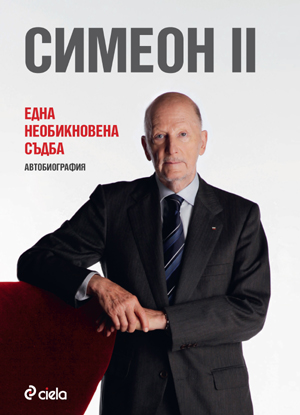The long-waited autobiographical book by Simeon Saxe-Coburg-Gotha has already been released on the market. Tsar of the Bulgarians during his childhood (1943-1946), he spent decades in exile before becoming Prime Minister of Bulgaria in the period 2001-2005. The book is entitled “The extraordinary life story of a Tsar” and reveals little-known or completely unknown facts from his life.
 “These are not extensive memoirs and the book is more of a review of a life. Or as my daughter Kalina put it – a review of the meaning of a life,” Simeon Saxe-Coburg-Gotha said during the presentation of his book. “This was one of my goals because of the number of myths that have constantly been in circulation around me. It is a different thing when one talks in the first person and I wanted to leave something for history; to describe a period that has often been neglected or even erased from memory for different reasons.”
“These are not extensive memoirs and the book is more of a review of a life. Or as my daughter Kalina put it – a review of the meaning of a life,” Simeon Saxe-Coburg-Gotha said during the presentation of his book. “This was one of my goals because of the number of myths that have constantly been in circulation around me. It is a different thing when one talks in the first person and I wanted to leave something for history; to describe a period that has often been neglected or even erased from memory for different reasons.”
"Talking about oneself is always difficult, and even more so when upbringing and environment are an obstacle to this, as is the case in royal families" - says Simeon II. His fate is truly extraordinary because of a number of factors. He is the first monarch in history who, after 50 years of exile, returned to Bulgaria to become Prime Minister. During his term of office Bulgaria managed to become a member of NATO. "I pursued a policy of reconciliation out of necessity,” he says. The truth is that many people expected him to take his revenge on people from the former communist regime because of what they had done to him and his family, but he never did. When presenting the book, former MEP from the National Movement Simeon the Second - Stanimir Ilchev summarized some of the reasons why the book was written:
 "I think we can talk of three sets of reasons. The first is connected with history and Simeon Saxe-Coburg-Gotha's attitude to it. The book highlights important elements like duty to the state and family. The second group of reasons is the wish to leave for posterity his unique administrative and business-oriented know-how, as well as his life experience, as during the 50 years of exile Simeon Saxe-Coburg-Gotha's life was not a string of days filled with contemplation. Simeon II has been part of big business and has established contacts with some outstanding people. He has played the discrete function of mediator in difficult situations. So, one of the reasons to write such a book is to share this experience. The third reason is that Simeon II is totally at variance with a group of people whom he calls revisionists - people who wait for all participants in a given events to pass away in order to start distorting history and slinging mud."
"I think we can talk of three sets of reasons. The first is connected with history and Simeon Saxe-Coburg-Gotha's attitude to it. The book highlights important elements like duty to the state and family. The second group of reasons is the wish to leave for posterity his unique administrative and business-oriented know-how, as well as his life experience, as during the 50 years of exile Simeon Saxe-Coburg-Gotha's life was not a string of days filled with contemplation. Simeon II has been part of big business and has established contacts with some outstanding people. He has played the discrete function of mediator in difficult situations. So, one of the reasons to write such a book is to share this experience. The third reason is that Simeon II is totally at variance with a group of people whom he calls revisionists - people who wait for all participants in a given events to pass away in order to start distorting history and slinging mud."
Simeon Saxe-Coburg-Gotha expressed the hope that Bulgarians would still find a national cause that could unite them, as they did in 2007 when Bulgaria joined the EU.
English: Alexander Markov
The Boyana Church will be an attractive center for the delegates of the 47th session of the UNESCO World Heritage Committee , who will gather in Sofia in July this year. The Church of St. Nicholas and St. Panteleimon is one of the..
The Nikola Vaptsarov Naval Academy in Varna has marked 144 years since its founding. A period in which the educational institution has followed the trends for highly specialized training of specialists in various professional fields..
Quiet among the Lyulin Mountain slopes, the Klisura Monastery of St. Petka is marked by mystery and radiates spirituality. It is located only 7 km from the resort town of Bankya, near the village of Klisura. Winter is the time when the holy monastery..
On 3 March, Bulgaria celebrates the 147th anniversary of its liberation f rom five centuries of Ottoman rule. The day was declared a national holiday in..
There is a map which helped usher in the birth of modern Bulgaria during the Russo-Turkish War of 1877-1878. The Austro-Hungarian researcher Felix..
Batak is a name every Bulgarian remembers with deference and pain because the fate of the small town in the Rhodopes is scarred by one of the bloodiest..

+359 2 9336 661
